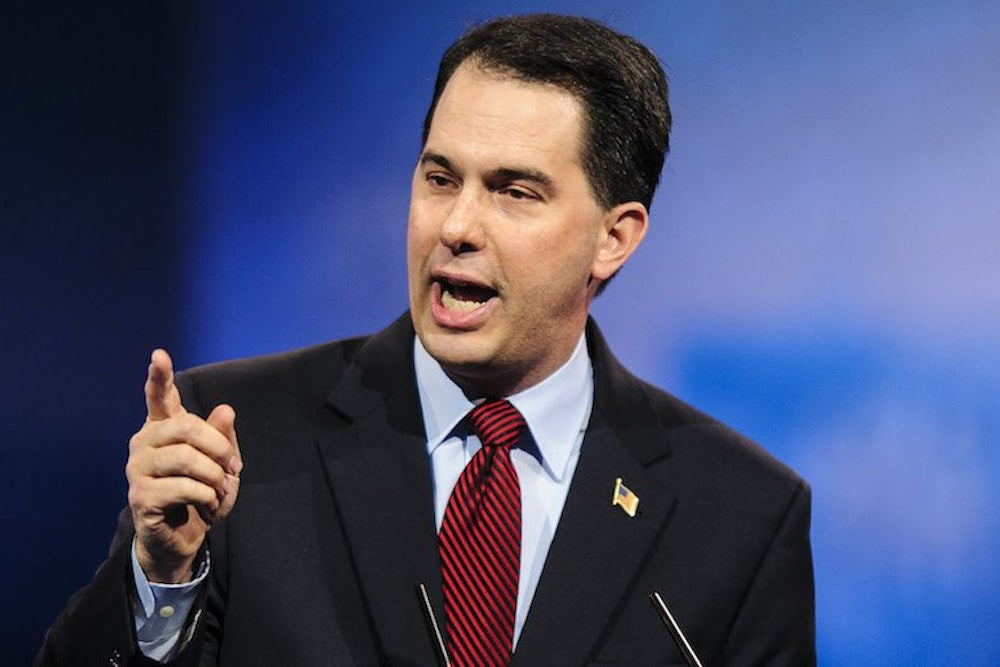Wisconsin Governor Scott Walker will release his budget plan to the state legislature this evening, which wouldn't really matter to anyone outside the state if he weren't planning to run for president in 2016. That means the second-term governor's budget isn’t just a plan for Wisconsin: It’s a campaign platform that seems to prioritize conservative ideology over the state's challenges. Walker's determination to stick to policies that have won him conservative cache might help him on the campaign trail, but for Wisconsin, it means sacrificing fiscal sense at the altar of low taxes.
Walker has made cutting taxes a top priority since he took office in 2011. Three years after he became governor, he had already worked with the state legislature to enact more than 65 tax changes, most of them cuts. Though the state was projected to be on its way to a $1 billion surplus last spring, his tax cuts contributed to pushing the state back in the red. By the time he ran for re-election this November, his cuts had helped create about a $1.8 billion budget shortfall projected through 2017. Now, Walker’s budget plan proposes to borrow money but shows no sign of raising taxes, which would conveniently let the presidential hopeful boast about how he kept taxes low across the state, even with a tight budget. He also plans to cut the University of Wisconsin system budget by $300 million. (He said that professors should just work harder to make up for the cuts, even though the university system president, Ray Cross, has said that professors already average more than 50 hours per week.)
Walker seems to have prioritized his 2016 platform over the state’s budgetary needs. The governor loves calling for fiscal responsibility—in his State of the State address, he called for a budget “based on the public's ability to pay, instead of the government's hunger to spend.” But his proposed budget plan doesn’t make good on his pledge: Despite calls from his own transportation secretary to boost the gasoline tax to pay for maintaining roads, Walker will propose to borrow $1.3 billion instead. “Twenty years ago, when I was in the Legislature, I was one of the 20 that voted against a gas tax increase, so I'm not particularly keen on raising the gas tax,” he told the Wisconsin Bankers’ Association in January. Walker’s focus on keeping his tax-cutting track record clean might help him in 2016, but it comes at the cost of sustainable solutions. About one-fifth of state money that goes toward the transportation fund is already used to pay down past debts, and that percentage would grow under Walker's plan.
Meanwhile, the governor has also announced plans to make room in the state budget to pay for the state’s welfare recipients to be drug tested, even without probable cause. The proposal dovetails nicely with Republican governors in other states, like Indiana’s Mike Pence or Maine’s Paul LePage, who have ratcheted up rhetoric about the “dignity of work.” Walker portrayed the drug testing as a gift to welfare recipients, saying that the measure would help people achieve “true freedom and prosperity.” But previous attempts by states to test welfare beneficiaries have revealed that these groups are no more likely to be addicted to drugs than anyone else. For the four months in 2011 that Florida drug tested its welfare applicants, only 2.6 percent of those tested failed (mostly for marijuana)—which meant that the drug-testing program cost the state more money than it saved. Walker's spokesperson, meanwhile, has claimed that the measure would save Wisconsin money. Plus, a federal judge eventually struck down the Florida law for testing all applicants, instead of just those suspected to be addicted to drugs. Dane County Executive Joe Parisi has already threatened to challenge Walker’s proposal in court, setting up the state for an expensive legal battle.
Even before Walker delivers his address Tuesday night, his plan has already been criticized by the right and left. Republican Assembly Speaker Robin Vos issued a statement criticizing Walker’s borrowing plan. "To continue to just borrow and spend isn't fiscally responsible," he said, amidst other Republican representatives’ calls for a more sustainable approach to the budget. Much of the budget details remain to be seen, but there’s one thing Wisconsinites can probably bet on: Walker will do anything to avoid raising taxes.
